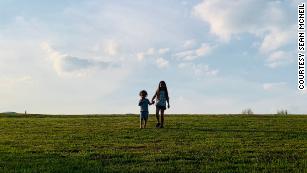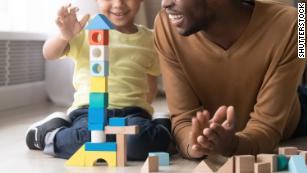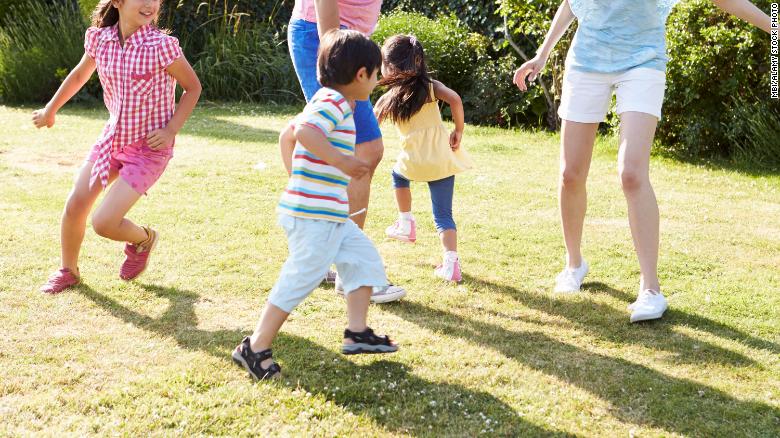(CNN)I’ll begin with a confession. Or maybe it’s a warning. I like playing with my kids. I don’t play with them every day, nor, consistently, every week. But when I do play with them things happen in my brain and body, positive things that counter the oppressive rigidity and repetition of adult life.This happens through all kinds of play, including family-wide games of charades, pretending plants can talk and impromptu lip-sync and dance parties.Parents, the same could be true for you.

How ‘alloparenting’ can be a less isolating way to raise kidsThere are a lot of bad reasons to play with your kids. It shouldn’t be about perfecting skill or achieving a particular outcome, which isn’t really play anyway. Or because you feel pressure to be a perfect parent and a perfect parent plays with their kids on a regular basis. Or because they asked you to, and you feel guilty saying “no.” Or because your kids can’t have fun without you. If that’s the case, maybe don’t play with your kids until they master the art of independent or sibling play.But there are also the good reasons, often overlooked in leisure-phobic culture. Parent-child play, when it authentically appeals to the parent, and works for their schedule, can do grown-ups a lot of good.
Defining ‘play’
Play isn’t any particular activity, so much as a “state of being,” explained psychiatrist Dr. Stuart Brown, founder and president of the National Institute for Play and author of “Play: How it Shapes the Brain, Opens the Imagination, and Invigorates the Soul.” It deeply engages us, and gives us pleasure, alters our sense of time and place, and the experience matters more than the outcome.”Nature has designed us to play in a variety of ways,” he said. “We are built to play and are built by play.”Play with kids can take many different shapes. It can be easily identifiable and include Legos, pretend, dress-up, sports, video games, board games or puzzles. Or it can be a playful approach to an activity that isn’t always thought of as playful: baking, gardening, watering the plants or washing the dogs. Or it’s spontaneous: making up funny songs in the car or goofing around having a pillow fight in bed on a Sunday morning.All of this is highly personal. The parent-child relationship is made up of two individuals with a distinct set of personality traits and desires. The type of play and frequency of play that works in one family will probably look different than what works for another family.

Many kids are struggling as they come out of pandemic isolation. Experts advise what may help with the transitionRight now, each of my sons has a favorite way of playing with me.My 4-year-old enjoys imagining that he is the dad and I am the baby. I lay down on the couch — yep! I don’t have to move — and he pretends to wash the dishes. Every so often I “interrupt” him with a problem that I, the baby, am having. I enjoy crafting the problems, which span from the sorrowful to absurd. (“I’m scared Daddy won’t come back from work.” “I think a glitter monster is going to cover me in slime.”) Even more, I adore hearing what solutions he comes up with to fix my problems. (“Don’t worry, baby, the glitter monster is really nice and will give you slime to play with. If it gets on you then you can take a bath!”)My older son, age 8, and I enjoy making up stories together, which we sometimes do while walking the dog. We have also recently taken up roller-skating as a family, which, apart from my former-hockey-playing husband, involves a lot of goofy trial and error.As children get older, play may look more like taking adventures together. For those who desire more play, children can make the best teacher.When Laurel Snyder’s kids were younger, she would play with them in more traditional and identifiable ways: Legos, sports and crafts. But now that they are teens, the play is less structured and more about cultivating shared experiences of surprise and wonder.”Last summer, while in lockdown, we started taking late night walks. We would go out at midnight and walk down to a park near our house, explore and listen to the cicadas,” said Snyder, a children’s book author who believes that play is good for the creative process. Recently, she has been extolling the virtues of play for the creative process in a lecture for fellow children’s book authors.”Without the pandemic, we would have never done that, but time was removed from our lives,” she said. “Once lockdown ended, and we could take a walk at a normal time, we discovered that we loved taking midnight walks. The world feels different at night.”
For those who desire more play, children can make the best teacher.When Laurel Snyder’s kids were younger, she would play with them in more traditional and identifiable ways: Legos, sports and crafts. But now that they are teens, the play is less structured and more about cultivating shared experiences of surprise and wonder.”Last summer, while in lockdown, we started taking late night walks. We would go out at midnight and walk down to a park near our house, explore and listen to the cicadas,” said Snyder, a children’s book author who believes that play is good for the creative process. Recently, she has been extolling the virtues of play for the creative process in a lecture for fellow children’s book authors.”Without the pandemic, we would have never done that, but time was removed from our lives,” she said. “Once lockdown ended, and we could take a walk at a normal time, we discovered that we loved taking midnight walks. The world feels different at night.”
Adults need more play
Many adults have an unhealthy relationship with time. Our collective obsession with productivity, work and self-optimization have left us with this relentless feeling that we are always behind the ball, never getting enough done. Worse, many of us are convinced that this is the result of a character flaw rather than a societal or structural flaw.
Continue Reading:https://edition.cnn.com/2021/07/05/health/play-with-your-kids-health-benefits-wellness/index.html






